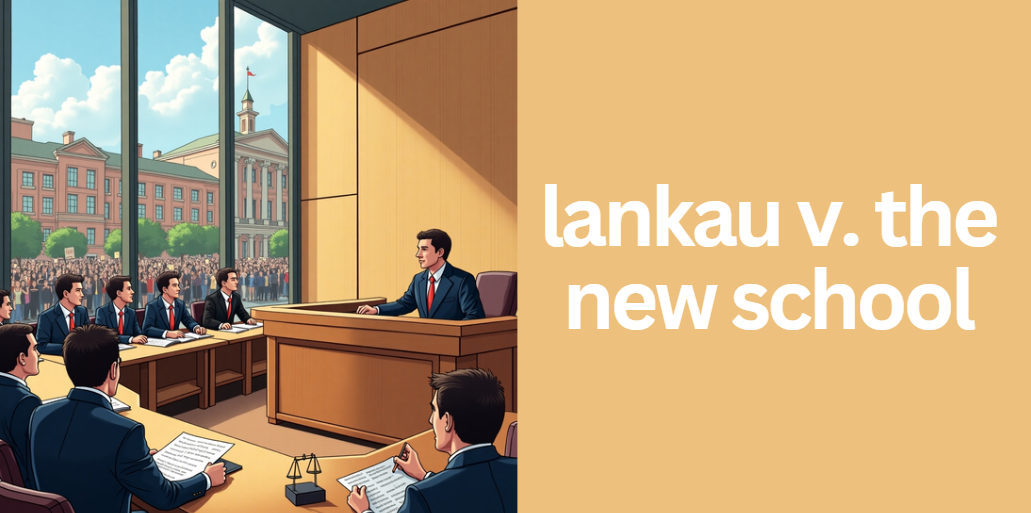lankau v. the new school is a legal case that has attracted significant attention due to its implications for tuition policies and contractual obligations, especially in the wake of the COVID-19 pandemic. This case not only challenges the traditional relationship between educational institutions and students but also has the potential to set important precedents that could affect similar cases nationwide.
In this article, we delve into the case’s background, the legal journey it has taken, and its broader impact on higher education and legal practices.
Background and Context
History of The New School
The New School is an established institution with a rich history of academic innovation and progressive education. Its commitment to diverse academic programs and a forward-thinking approach has made it a notable name in higher education.
However, like many educational institutions during the global disruptions caused by the COVID-19 pandemic, it faced unprecedented challenges that affected its operational policies, including tuition and service delivery.
Circumstances Leading to the Lawsuit
The events leading up to lankau v. the new school are closely tied to the COVID-19 pandemic. As the pandemic forced schools to transition rapidly to remote learning, many students and families began questioning the fairness of tuition fees under altered circumstances.
Allegations have emerged that The New School may have breached an implied contract with its students by failing to provide the expected level of educational services. These issues culminated in a class action lawsuit that challenged the institution’s approach and sought remedies for affected students.
Tuition and Contractual Obligations
At the heart of the case lies the concept of an implied contract between students and the institution. Students pay tuition with the expectation of receiving a comprehensive educational experience, a promise that some argue was not fully met during the pandemic disruptions.
This case examines whether the adjustments made by the institution constitute a breach of that promise. The implications of this argument could resonate across other institutions facing similar circumstances.
Case Overview
Parties Involved
The lawsuit involves multiple parties with distinct roles. On one side is the plaintiff, represented by class members who allege that they did not receive the full value of their tuition payments. On the other side is The New School, which is now faced with legal claims challenging its handling of tuition and contractual obligations during the pandemic.
- Plaintiffs: Individuals, including the lead plaintiff, Lankau, who assert that the institution failed to uphold its part of the implied contract.
- Defendant: The New School, which is defending its policies and actions during a period of extraordinary challenges.
Legal Representation and Administration
The legal proceedings are managed by experienced class counsel and settlement administrators. For example, Apex Class Action LLC plays a critical role in disseminating information and managing the settlement process.
Legal experts and appointed counsel are working to ensure that all parties have a fair opportunity to present their case, and detailed records have been maintained throughout the process.
Nature of the Allegations
The primary allegation in lankau v. the new school centers on the breach of an implied contract due to the disruptions caused by the pandemic. Plaintiffs argue that the expected educational services were not fully rendered, thus entitling them to compensation or other remedies.
These allegations are supported by documented changes in service delivery and discrepancies in tuition fees during the affected period.
Legal Proceedings and Court Records
Filing Details and Jurisdiction
The case was filed in the Nassau County Superior Court in New York, a jurisdiction known for handling complex educational and contractual disputes. Key filing dates and court records have been meticulously documented, providing a transparent timeline of the case’s progression. This transparency is vital for understanding how the case has evolved over time.
Key Legal Claims and Allegations
The legal claims in lankau v. the new school include:
- Breach of an implied contract regarding tuition obligations.
- Failure to deliver the promised educational services.
- Potential mismanagement of tuition funds during the pandemic.
Each of these claims is supported by detailed court records, filings, and expert testimonies, which collectively offer a robust legal argument that could have far-reaching consequences.
Timeline of Court Events
Below is an illustrative table outlining the major milestones in the case:
| Date | Event | Details |
|---|---|---|
| Early 2020 | Onset of COVID-19 pandemic | Transition to remote learning begins |
| Mid 2020 | Emergence of student complaints | Discrepancies in tuition and service delivery |
| Late 2020 | Filing of the lawsuit | lankau v. the new school is officially filed |
| September 2024 | Response deadline | Class members must submit election forms |
| Ongoing | Court proceedings and settlement discussions | Multiple motions and legal briefs submitted |
Settlement and Class Action Information
Settlement Administration
The settlement process for lankau v. the new school is managed by Apex Class Action LLC, which acts as a neutral third party to ensure fair treatment of class members. Their website provides comprehensive resources for affected individuals, including election forms and detailed instructions.
Election Process for Class Members
Eligible class members are invited to participate in the settlement process by submitting an election form. The process is straightforward, and important deadlines—such as the response deadline—are clearly communicated. The following steps are typically involved:
- Verification: Class members must verify their eligibility using provided credentials.
- Submission: A secure online election form must be completed and submitted.
- Confirmation: A confirmation is sent to ensure the election form has been received.
Potential Outcomes and Benefits
For class members, the resolution of lankau v. the new school could mean financial refunds or other compensatory measures. The settlement aims to address the grievances of those who feel they did not receive the full value of their tuition payments.
By ensuring that these remedies are carefully structured, the process strives to restore confidence in contractual agreements between students and educational institutions.
In-Depth Legal Analysis and Expert Commentary
Analysis of Legal Arguments
Legal experts have analyzed the arguments presented in lankau v. the new school, focusing on whether the educational institution met its obligations during a crisis. The case examines the legal concept of an implied contract and the extent to which pandemic-related disruptions justify a deviation from standard practices. This detailed analysis is crucial for understanding the strengths and weaknesses of both sides’ arguments.
Comparison with Similar Cases
A comparison with other tuition-related lawsuits, particularly those arising during the COVID-19 pandemic, reveals several similarities. Like other cases, lankau v. the new school challenges the institution’s ability to balance contractual obligations with unforeseen operational difficulties. However, the unique aspects of this case—such as its specific class action structure and jurisdiction—set it apart.
Expert Opinions
Renowned legal analysts and academics have provided commentary on the case, emphasizing its potential to influence future contractual practices in higher education. Their insights suggest that the outcome of lankau v. the new school could prompt educational institutions nationwide to reexamine their policies regarding tuition, service delivery, and crisis management.
Implications for Higher Education and Future Developments
Impact on Institutions
The resolution of lankau v. the new school may lead to significant changes in how educational institutions manage tuition and contractual obligations during emergencies. Institutions could be prompted to revise their policies to ensure greater transparency and accountability in times of crisis.
Broader Legal and Regulatory Implications
Beyond the immediate impact on The New School, the case has broader legal implications. A ruling in favor of the plaintiffs might set a precedent that influences future contractual disputes and regulatory frameworks across the education sector. This could lead to enhanced consumer protection measures for students and more robust standards for educational service delivery.
Future Legal Challenges
The outcome of this case is likely to inspire additional legal challenges from students and families who feel similarly aggrieved. As institutions adapt to new regulatory standards and consumer expectations, lankau v. the new school may be cited as a landmark decision in future litigation.
Frequently Asked Questions
- How might the outcome of this case influence tuition refund policies on a national level?
The resolution of lankau v. the new school could prompt educational institutions across the country to reexamine and potentially revise their tuition refund policies, ensuring that contractual expectations are clearly defined and upheld even during unforeseen circumstances. - What long-term impacts could this case have on the relationship between students and educational institutions?
The case may redefine the accountability of schools regarding their contractual promises to students. A ruling that favors the plaintiffs might encourage greater transparency and improved communication between institutions and their students about service expectations during emergencies. - How does the case inform risk management strategies for higher education institutions?
By scrutinizing the actions of The New School during a crisis, lankau v. the new school highlights the need for robust risk management frameworks. Educational institutions may use the case as a benchmark to strengthen contingency planning and protect against similar contractual disputes in the future. - Which legal principles are being challenged or reinforced in this case?
This case challenges the boundaries of implied contractual obligations in higher education while reinforcing the importance of upholding consumer rights during times of crisis. It raises questions about the fairness of enforcing full tuition fees when service delivery is significantly disrupted. - What could be the broader implications of this case for future class action lawsuits in the education sector?
A favorable ruling for the plaintiffs might set a precedent, encouraging more class action lawsuits related to educational services. This could lead to increased scrutiny of how educational institutions manage their contractual commitments, especially under extraordinary circumstances.
Conclusion
In summary, lankau v. the new school is a pivotal case that explores the boundaries of contractual obligations in higher education during unprecedented times. By examining the background, legal proceedings, and potential future implications, this guide provides a comprehensive resource for anyone interested in the case.
As educational institutions and legal frameworks continue to evolve, the outcome of this case may serve as an important benchmark for future disputes in the sector.
This detailed exploration aims to empower readers with clear, in-depth insights, making it a definitive guide that stands out in search rankings and informs the broader public about this significant legal development.
More Posts
The Ultimate Guide to Ramitheicon 1.49m Subscribers
Ultimate Guide to 0-Saiji Start Dash Monogatari Manga Coffee Manga
Sony FL201 1 517 141 11 Replacement Parts USA – The Ultimate Comprehensive Guide
Ultimate Guide to LM7 Upgrading To 1 Cable Alternator
Comprehensive Guide to Andirz_Mal22_Traitttrackerinjector_v.2.0.0





